Odd Arts
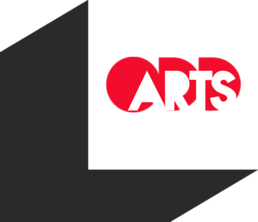
Odd Arts
Odd Arts are a theatre organisation that work within criminal justice, education, community & health settings. All of our theatre work is aimed at reducing & challenging inequalities, and increasing opportunities for people facing the greatest level of discrimination or disadvantage.
- Interactive Theatre tours (issues include mental health, knife crime, sexual assault, exploitation and many more)
- Therapeutic Theatre Workshops (often aiming to reduce violence or harm to self and others; or increase wellbeing)
- Community led social action projects (using theatre, visual arts, story-telling and film to address systemic inequalities)
- Anti-racism
- Trauma informed approaches
- Uses non-violent communication & restorative approaches
- Developed with people with lived experience of the issues we address
We work in Greater Manchester & the North West and Midlands. We work with over around 30,000 people per year, including around 80 high schools. Other settings include secure units, PRUs, mental health units, prisons, community centres, youth groups, probation, and asylum-seeking / refugee organisations.
- 3 formal academic papers published on it’s impact
- Published in the ‘Applied Theatre Journal’ and ‘How to become a less violent society’
- Received commission for best practices in preventing radicalisation at EU Parliament
- Alumni of the US Embassy Exchange on Countering Violent Extremism
Skills Builder Partnership
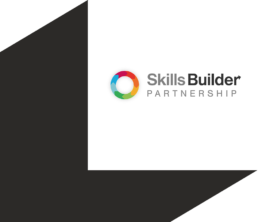
Skills Builder Partnership
The Skills Builder Partnership brings together more than 800 organisations towards a common mission, joined by shared language, principles and outcomes. Our mission is to ensure that, one day, everyone will build the essential skills to succeed. Our starting point is eight essential skills, the core, transferable skills for every aspect of our lives. In pairs, they cover communication, creative problem-solving, self-management and collaboration skills.
The Skills Builder Universal Framework shows how to build essential skills at every stage of life.
- 16 teachable, learnable and measurable steps for each skill
- Universal language for children, young people and adults
- Sets expectations for staff and students to assess progress
- Demonstrates and measures short- and long-term progress
- Easily transferable across contexts
- Allows for tracking over time, to maximise impact
The Skills Builder Inclusive Organisations Cluster has brought together the huge expertise of a range of key partners who build essential skills in an inclusive way.
These contributions, aligned to the voices of neurodiverse and disabled people’s experiences, are the driving force for the Skills Builder Inclusive Organisations Guide. The Guide is to support organisations to use the Skills Builder Expanded Universal Framework and contains practical support on skill development, including key considerations when working with a range of learners.
Our most recent Impact Report charts how the Partnership has delivered 1,468,611 opportunities for individuals to boost their essential skills this year. This combines the 187,783 individuals who built their essential skills through programmes that were run in schools and colleges and includes a further 65,504 who benefited as individuals from our products. It also includes the wider impact of 1,215,324 opportunities for individuals to build their essential skills through approved programmes of partners, many of which draw upon the guidance of the Inclusive Organisations Guide.
Transgender Rights' Toolkit
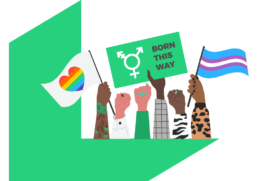
Transgender Rights' Toolkit
Transgender Rights' Toolkit
Toolkit collated by Georgie Williams with Jo Brassington
What Does Transgender Mean?
Transgender (often shortened to trans) is an umbrella term, it describes individuals whose gender identity is not entirely aligned with the gender that was assumed of them based on their birth sex. This includes transgender men and transgender women. Transgender women were assigned ‘male’ at birth, and therefore assumed to be men, but they do not identify with this assumed gender and instead identify as women. Whereas a transgender men were assigned ‘female’ at birth, and therefore assumed to be women, but they do not identify with this assumed gender and instead identify as men.
Some transgender people identify outside of the gender binary of ‘men’ or ‘women’. Often these people use terms such as nonbinary, among other terms that feel right for them. Nonbinary identities and language may be new and developing, but everybody should be able to find language that allows them to accurately and meaningfully talk about their experience of gender.
Historically, many people have fallen into using language that excludes trans people. For example, talking about two groups: transgender people, or ‘normal’ people. To avoid this, it can be useful to have a name for that second group of people who are not trans. This is why we sometimes use the word ‘cisgender’ to refer to any person whose gender identity does align with the gender they were assumed based on their birth sex. Using this word can help us to be more accurate when talking about trans people, and it acknowledges that all of us have an experience of gender. Gender is not just a trans issue.
Transgender people are legally protected from discrimination, victimisation, and harassment through The Equality Act of 2010 and we should endeavour to create safe educational spaces for them. It is statutory for all schools to ensure transgender identities are integrated into Relationships & Sex Education. Furthermore, the statutory safeguarding guidance ‘Keeping Children Safe In Education’ tells educators they should be endeavouring to reduce any additional barriers faced by trans young people, and create safe spaces for them.
Transgender women are women, transgender men are men, and nonbinary transgender people’s identities should also be respected. Allyship can ensure that transgender individuals’ identities are recognised, respected and protected.
- Acknowledging and respecting the language people use, including their name, their title, and their pronouns.
- Supporting and safeguarding transgender individuals who are at risk of discrimination and prejudice
- Creating trans-inclusive spaces e.g.: gender-neutral bathrooms
- Using gender-neutral language for groups and for individuals whose gender is not known
- Creating workplaces which support trans needs (e.g.: non-gendered dress codes, paid leave for employees undergoing transitional therapies)
- Advocating for and defending the rights of transgender peers when challenged
The Diverse Educators’ Transgender Rights Toolkit
We are collating a growing bank of resources to support you in how you show up, how you stand up and how you speak out, on matters pertaining to transgender rights and welfare.
Blogs
Books
Podcasts
Resources
Videos
LGBTQ+ Inclusion Toolkit
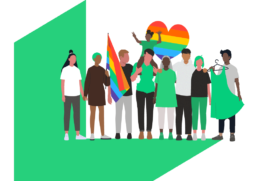
LGBTQ+ Inclusion Toolkit
LGBTQ+ Inclusion Toolkit
Toolkit collated by Bethan Hughes and Holly Parker-Guest with Jo Brassington
What Is LGBTQ+ Inclusion?
- Lesbian
- Gay
- Bisexual
- Transgender
- Queer (sometimes Questioning)
- The plus allows space for a vast spectrum of sexual and/or romantic orientations, as well as gender identities. This includes: Intersex, Asexual, Aromantic, Non-Binary, Pansexual, and other language that people use to identify and meaningfully talk about their experience.
Since the 1990’s there has been significant progress in some areas of LGBTQ+ rights within the UK: from same sex marriage being made legal, to introducing the world’s first transgender action plan in 2011. More recently, we’ve seen positive progress within education: from the inclusion of LGBT+ relationships in compulsory Relationships and Sex Education, to the introduction of LGBT+ young people in the statutory safeguarding guidance Keeping Children Safe In Education.
It is important that we are creating inclusive educational environments where all students feel safe and represented – and this must include LGBTQ+ students. However, there is still much work to do to create LGBT+ inclusive educational spaces.
- Nearly half of LGBT pupils (45 per cent) – including 64 per cent of trans pupils – are bullied for being LGBT in Britain’s schools. This is down from 55 per cent of lesbian, gay and bi pupils who experienced bullying because of their sexual orientation in 2012 and 65 per cent in 2007
- Half of LGBT pupils hear homophobic slurs ‘frequently’ or ‘often’ at school, down from seven in 10 in 2012
- Seven in 10 LGBT pupils report that their school says that homophobic and biphobic bullying is wrong, up from half in 2012 and a quarter in 2007. However, just two in five LGBT pupils report that their schools say that transphobic bullying is wrong
- Just one in five LGBT pupils have been taught about safe sex in relation to same-sex relationships
- More than four in five trans young people have self-harmed, as have three in five lesbian, gay and bi young people who aren’t trans
- More than two in five trans young people have attempted to take their own life, and one in five lesbian, gay and bi students who aren’t trans have done the same
More recent evidence from the 2021 Just Like Us ‘Growing Up LGBT+ Report’ found that LGBT+ young people were twice as likely to be lonely or worried daily about their mental health. Furthermore, a large-scale pupil safeguarding survey conducted in 2023 by The Key found that LGBT+ young people feel considerably less safe in school than their counterparts.
It has been proven that providing an LGBTQ+ inclusive education reduces incidents of homophobic, biphobic and transphobic bullying as well as improving the mental wellbeing of LGBTQ+ youths. Ensuring that education is LGBTQ+ inclusive is imperative as attitudes learnt at school go with that young person into the world, the workplace and the wider community. Everyone (LGBTQ+ or not) benefits from a more inclusive education.
The Diverse Educators’ LGBTQ+ Inclusion Toolkit
We are collating a growing bank of resources to support you to be able to stand up, speak up and celebrate members of the LGBTQ+ community in your school.
- How can we avoid LGBTQ+ discrimination in our schools?
- How can I encourage all school staff to understand the benefits of LGBTQ+ inclusion?
- How do I challenge LGBTQ+ discrimination-based language and incidents?
- How do I support LGBTQ+ students to share their identity in our schools, if they choose to?
- How can we create an LGBTQ+ inclusive culture and ethos in our schools?
What Does Good LGBTQ+ Inclusion Look Like?
- Bullying and use of derogatory language is consistently challenged
- Gender neutral language is used across the school and in policies
- Stereotypes are challenged – in the curriculum, in policies and in conversations
- An inclusive curriculum where LGBTQ+ identities are embedded – not just stand-alone lessons
- Diverse LGBTQ+ role models are visible
- Staff need to have the training and the confidence to know how to support LGBTQ+ young people
- Also, don’t underestimate visibility of LGBTQ+ members of staff and the impact of seeing them treated well. If students can see their teachers thriving then they are more likely to see how they can thrive too.
If, as educator we can create LGBTQ+ inclusive educational spaces, then we are not only setting young people up for success in our schools, but in society too.
Articles
Blogs
Books
Dr Barnes, Elly and Dr Carlile, Anna. How to Transform Your School into an LGBT+ Friendly Place: A Practical Guide for Nursery, Primary and Secondary Teachers
Podcasts
Resources
Videos
Young Citizens
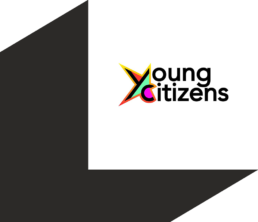
Young Citizens
Young Citizens is a national charity lighting the spark of active citizenship in the next generation. Established in 1989, it delivers skills, knowledge and enrichment to over 500,000 children each year through a dynamic range topical classroom resources and immersive learning experiences.
Its team of education experts works to equip young minds with the confidence to shape both local communities and powerful systems. They do this by mobilising teachers, professionals and policy makers to transfer expertise to the people who need it most, making complex current affairs accessible to all. Ultimately, they want to see a thriving, inclusive and youth-led democracy.
The charity has a diverse portfolio of learning projects for schools and youth groups to enjoy. Whether it be through interactive mock trial competitions, workshops with professionals or social action programmes in school, it is dedicated to inspiring the next generation of active participants in society
The organisation is ambitious in its scope, covering democracy, sustainability, the economy, media, human rights and more. It empowers educators and volunteering to deliver core citizenship values through specialist training and resources. Its mission is to help young people become active citizens for life.
- mobilised more than 300,000 young people to take social action
- engaged over 150,000 young people in understanding the law and the legal system
- reached millions of young people with citizenship programmes and classroom resources
Worth-it Positive Education CIC
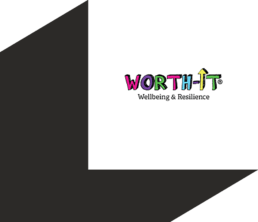
Worth-it Positive Education CIC
Worth-it was founded with the aim to apply evidence-based approaches of positive psychology and coaching psychology to create real change and prevent mental health problems for children and young people. This developed into our innovative approach to prevention, through improving wellbeing and developing positive mental health. We work with schools and organisations to increase capacity to provide early intervention and prevention. We specialise in supporting schools apply positive education.
HOPE not hate
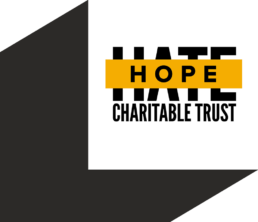
HOPE not hate
We work with schools to train teachers and with students to challenge prejudice. The anti-racism work we deliver in schools stems from the Education Unit having grown out of a community organising approach. Our aim is not just to educate students on racism, but also to be a catalyst towards positive behavioural change in schools across the country, which can act as a springboard towards a more inclusive society.
Yes She Can
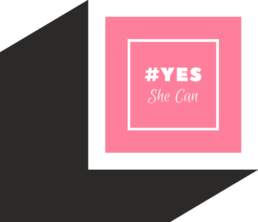
Yes She Can
We Inspire, Empower and Engage. We inspire our community to break career glass ceiling. We showcase inspirational women and provide real life role models. We upskill, coach and mentor people to help them be the best that they can be in their career. We engage with great businesses and educational establishments to support them on their Diversity journey. We deliver workshops, training and strategy consultation to help drive change.
The Ogden Trust
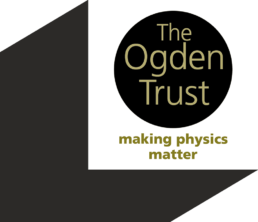
The Ogden Trust
The Ogden Trust aims to increase the uptake of physics post-16 by supporting physics education and engagement for all young people (4-18), particularly those in under-represented groups. The Trust supports schools, teachers, projects and programmes that are committed to enhancing physics teaching and learning.
Through school-led partnerships the Trust helps to build and sustain supportive, collaborative teaching communities that can bring about improvement in physics education, engagement and learning environments. The Trust offers support for teachers of physics through the provision of professional development, subject knowledge, skills and resources.
We work with universities, employers and community groups to help widen access to physics enrichment and to encourage more people to understand the career pathways that can be opened up through physics.
Our primary science curriculum resources on our website have been written by primary experts and physics specialists and are aimed at supporting the delivery of hands-on science in the classroom. Many of our secondary resources are provided by partners and associates of the Trust and we are pleased to signpost you to these excellent teaching and learning aids. There are Ogden resources that will be useful in secondary, particularly KS3.
In addition, we have a series of ‘How to’ guides from our partnership schools which offer first-hand advice on running enrichment activities, creating effective partnerships for science and raising the profile of physics within your school.
Our ‘Phizzi professional’ series gives an insight into just some of the many and varied careers available to aspiring young physicists. These resources can be used by primary and secondary practitioners.
We regularly run news stories and celebrate histories, i.e. Black History month
We have 6 research cards featuring inspirational black physicists for you to download
We will be celebrating LGBT+ History in February with resources
Teach First Multi-Faith Network
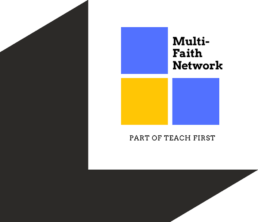
Teach First Multi-Faith Network
We’re a group of teachers who aim to support, develop and inspire people of all faiths in the Teach First community. We have grown a lot since last June and have been holding events where people can get to know each other, learn more about teaching as a person of faith, and be reminded of why they started teaching.
We appreciate that teachers are busy, and that people experiencing discrimination can feel isolated. That is what we aim to challenge, by showing teachers that they are not alone. We connect teachers from a range of beliefs and offer a helping hand as they live out their faith.
We aim to meet every term, and because we have members from across the country, we do this online. We have events where we aim to develop our members as teachers, to help us live our faith through our work. We also have events where we reflect on why we teach, to help us to go to work with enthusiasm and passion.
If you’d like to get involved, we have newsletters which come out every term, and a number of micro-networks for personal support. Sign up and we’ll be in touch.

